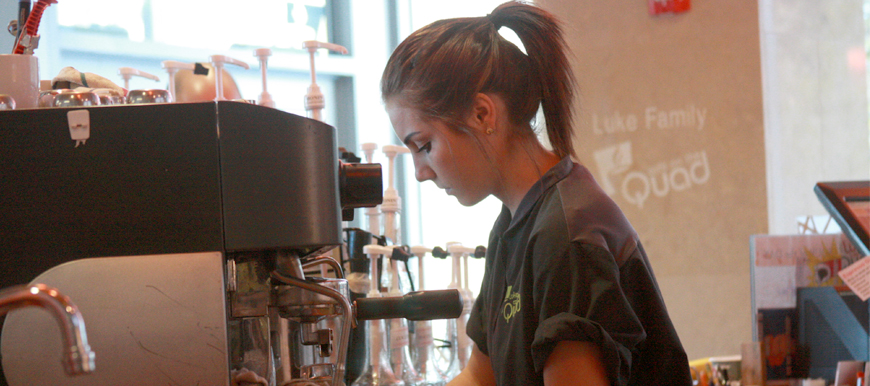Food and faith
It is difficult for Muslim students to find meat products they can eat on campus, said Ayman Alafifi, a Utah State University Ph.D. student and president of the Logan Islamic Center committee.
Alafifi said food products that Muslims can eat are known as halal, which includes foods that do not contain alcohol, pork or blood and are not meats from carnivorous animals. All meat products have to come from an animal that was slaughtered by having all its blood drained from a vein in its jugular in the name of God.
Alafifi said the majority of Muslims only eat meat when it has the halal logo on it, which means it was slaughtered properly.
“(It) doesn’t have to be a Muslim who slaughtered it, but it has to be slaughtered properly,” he said. “The blood was drained from the animal before it was cut, and it was not made for another idol.”
Alafifi said some Muslim scholars, who cannot find meat slaughtered in the name of God, have relaxed the rules for those living in the west. He said some Muslims will eat meat as long as it fits the other criteria.
Alafifi said because of a lack of halal options on campus, some Muslims eat the meat offered.
“But other than that, people can go vegetarian,” he said. “You can eat seafood if you want. They always have tuna sandwiches here.”
Vegetarianism is another lifestyle that faces problems when it comes to on-campus food.
David Tauber, a Buddhist student majoring in religious studies and anthropology, said his faith has led him to live a vegetarian lifestyle even though not everyone in his religion does so. He said his decision stems from two concepts: compassion and the rule for lei Buddhists against killing.
“When I first read it I thought, ‘Oh, that’s going to be the easiest rule to follow. I haven’t killed anybody in years,'” Tauber said. “But they actually meant no killing sentient beings, which in Buddhism all creatures are considered sentient. So you are not to harm anything.”
Tauber said this does not include plants. The rule is to not intentionally kill beings in the animal kingdom, and Buddhists follow it to varying degrees. He said being a vegetarian is a personal choice that he feels he needs to do.
“Ultimately the reason I became a vegetarian was I became more aware of the suffering of the animals that I was eating,” Tauber said. “And I started feeling very depressed at mealtime because I was like, ‘My food is requiring the death of another being. I don’t know how I feel about that.'”
Tauber said he stopped eating meat because he felt bad about it.
“I started feeling much better when I became a vegetarian,” Tauber said.
Tauber said though it can be difficult, vegetarian options on campus can be found.
“I’ve been eating vegetarian for almost two years now, and I live off Marketplace and Junction food because I live on campus,” Tauber said.
Tauber said though possible, the options are limited. He said another problem stems from a rumor he had heard from people working in the Hub that people are not always careful about separating food. In other words, he said meat can get spilled over into beans.
“It’s not necessarily being done because the people are actually careless but probably being done because they aren’t aware that it’s important to be careful with some of these things, that it actually matters to people that they are careful,” he said.
Samantha Brimhall, a junior majoring in journalism and communications who works at the Hub, confirmed that meat sometimes gets in the beans at Taco Time.
“Yeah it sometimes spills over, but I always try to clean it out and try to teach the new people to clean it out just because of the vegetarian stuff,” Brimhall said.
Brimhall said though they try, Hub employees sometimes forget about it during the lunch rush.
Alan Andersen, executive director for dining services, said there are plenty of vegetable options for vegetarian students.
“If we’re categorizing the faith things with vegetarians, I think there’s plenty of options,” Andersen said. “Now, when you get into specific like halal meats or kosher meats or things like that, it becomes much, much harder.”
Andersen said the halal and kosher options are more expensive, and he has not seen enough demand to do anything about it. He said this year, only one person has approached him about halal.
“In my business, we really base what we do on demand,” Andersen said. “We sell what our customers want.”
— topherwriter@gmail.com

